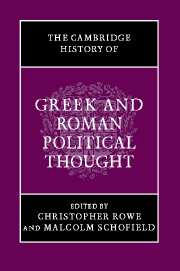Book contents
- Frontmatter
- Introduction
- PART I ARCHAIC AND CLASSICAL GREECE
- PART II THE HELLENISTIC AND ROMAN WORLDS
- 20 Introduction: the Hellenistic and Roman periods
- 21 The Cynics
- 22 Epicurean and Stoic political thought
- 23 Kings and constitutions: Hellenistic theories
- 24 Cicero
- 25 Reflections of Roman political thought in Latin historical writing
- 26 Seneca and Pliny
- 27 Platonism and Pythagoreanism in the early empire
- 28 Josephus
- 29 Stoic writers of the imperial era
- 30 The Jurists
- 31 Christianity
- Epilogue
- Bibliographies
- Index
- Map 1. Greece in the fifth century bc"
- References
20 - Introduction: the Hellenistic and Roman periods
from PART II - THE HELLENISTIC AND ROMAN WORLDS
Published online by Cambridge University Press: 28 March 2008
- Frontmatter
- Introduction
- PART I ARCHAIC AND CLASSICAL GREECE
- PART II THE HELLENISTIC AND ROMAN WORLDS
- 20 Introduction: the Hellenistic and Roman periods
- 21 The Cynics
- 22 Epicurean and Stoic political thought
- 23 Kings and constitutions: Hellenistic theories
- 24 Cicero
- 25 Reflections of Roman political thought in Latin historical writing
- 26 Seneca and Pliny
- 27 Platonism and Pythagoreanism in the early empire
- 28 Josephus
- 29 Stoic writers of the imperial era
- 30 The Jurists
- 31 Christianity
- Epilogue
- Bibliographies
- Index
- Map 1. Greece in the fifth century bc"
- References
Summary
The transition from Classical to Hellenistic philosophy coincided with the passage from a Greek world in which the polis was the dominant political formation to one presided over by large central states. The first of these was the kingdom of Macedon. The advance of Macedon was swift. In no more than four decades, beginning with the rise to power of Philip II in 359bc, Greece was subdued, the massive Persian empire conquered (334–327), and democracy in Athens crushed (in 319). In this last act Macedon was all but finishing off not only democracy (only Rhodes remained democratic, for a time), but also the independent polis. In fact, freedom and independence had been enjoyed in their fullness in the fifth and fourth centuries only by a few hegemonic poleis (principally Athens, Sparta and Thebes), which dominated the mass of smaller Greek poleis through their leagues, or polities (such as Caria under Mausolus in 377/6–353, and Thessaly under Jason in the 370s). Athens was the last of the hegemonic poleis. After the death of Alexander in 323, the unified Macedonian empire quickly gave way to the Successor Kingdoms of the Hellenistic age based on Macedon, Syria and Egypt, which in turn were absorbed, finally and conclusively, by Rome. After establishing itself, at the expense of Carthage, as the leading power in the Western Mediterranean, Rome in the course of the second century bc became dominant also in the Eastern Mediterranean.
- Type
- Chapter
- Information
- The Cambridge History of Greek and Roman Political Thought , pp. 397 - 414Publisher: Cambridge University PressPrint publication year: 2000

